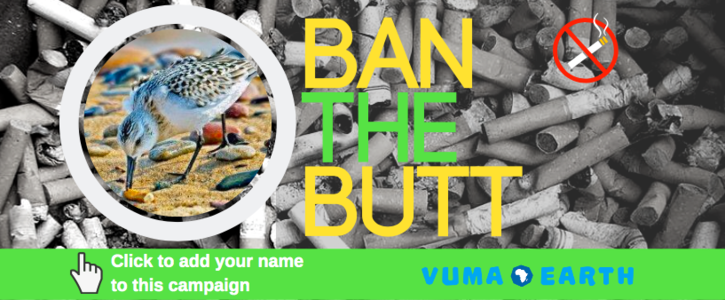5,000 signatures reached
To: SA Department of Environmental Affairs
Ban The Butt in South Africa

We call on our government to introduce legislation that will force tobacco companies to:
1. Remove cigarette filters or make them fully biodegradable
2. Take responsibility for the disposal of cigarette butts and all other cigarette waste, and also carry the cost of the management and disposal of cigarette waste;
3. Ensure the safe disposal of all cigarette waste material.
1. Remove cigarette filters or make them fully biodegradable
2. Take responsibility for the disposal of cigarette butts and all other cigarette waste, and also carry the cost of the management and disposal of cigarette waste;
3. Ensure the safe disposal of all cigarette waste material.
Why is this important?
Cigarette butts are the most commonly discarded type of litter globally and are the most frequent item of litter picked up on beaches and other water bodies worldwide.
In South Africa cigarette butts continue to be the third most common item of litter found on beaches during clean-ups. Around 23.49 billion cigarettes are consumed in South Africa each year (NIDS, 2015), with global evidence showing that the majority of these are not thrown away in a waste bin (www.cigwaste.org).
Of particular environmental concern is the fact that the filters used in cigarettes are not bio-degradable because they are made out of cellulose acetate - a form of plastic. They can take months or even years to break down into smaller pieces of plastic but will not biodegrade. The tobacco remnant is biodegradable because it’s made from plant material, but is still poisonous to humans, animals, aquatic organisms and the environment (Tobacco and its environmental impacts, World Health Organisation Report, 2017).
Cigarettes do not need to have a filter because they are not healthier for the smoker – they only make cigarettes less harsh to smoke and therefore taste better, increasing the risk of addiction. Cigarette butts seep chemicals and toxins such as nicotine, arsenic and heavy metals into the water and land, contaminating it long after the cigarette has been smoked and the butt thrown away.
A recent study showed that half of the fish left in both fresh and salt water polluted with cigarette butts died as a result of this exposure, even though the cigarette butts had only been in the water for 96 hours (Tobacco and its environmental impacts, World Health Organisation Report, 2017).
In Cape Town alone, more than 300 kg of cigarette butts thrown into bins are collected by cleaners each month. This is just a small fraction of the hundreds of kilograms of cigarette butts that city officials say are thrown on the ground (Keep it Clean Campaign).
In line with the polluter pays principle, tobacco companies that produce cigarettes need to take responsibility for the collection and appropriate disposal of cigarette butts, and not shift this responsibility to municipalities, and the taxpayer as they currently do.
References
Africa Labour and Development Research Unit. National Income Dynamics Study 2017, Wave 5 [dataset]. Version 1.0.0 Pretoria: Department of Planning, Monitoring, and Evaluation [funding agency]. Cape Town: Southern Africa Labour and Development Research Unit [implementer], 2018. Cape Town: DataFirst [distributor], 2018.
https://doi.org/10.25828/fw3h-v708
https://www.bizcommunity.com/Article/196/703/186811.html
https://www.iol.co.za/capetimes/news/keepitclean-it-costs-r30-000-per-day-to-keep-cape-town-clean-20946460
https://www.cigwaste.org
https://www.getaway.co.za/travel-news/cigarette-butts-cause-more-damage-than-plastic-straws/
https://www.news24.com/SouthAfrica/Local/UD-News/top-pollutants-on-beaches-20190220
World Health Organisation, Tobacco and its environmental impacts Report, World Health Organisation, Geneva, 2017.
In South Africa cigarette butts continue to be the third most common item of litter found on beaches during clean-ups. Around 23.49 billion cigarettes are consumed in South Africa each year (NIDS, 2015), with global evidence showing that the majority of these are not thrown away in a waste bin (www.cigwaste.org).
Of particular environmental concern is the fact that the filters used in cigarettes are not bio-degradable because they are made out of cellulose acetate - a form of plastic. They can take months or even years to break down into smaller pieces of plastic but will not biodegrade. The tobacco remnant is biodegradable because it’s made from plant material, but is still poisonous to humans, animals, aquatic organisms and the environment (Tobacco and its environmental impacts, World Health Organisation Report, 2017).
Cigarettes do not need to have a filter because they are not healthier for the smoker – they only make cigarettes less harsh to smoke and therefore taste better, increasing the risk of addiction. Cigarette butts seep chemicals and toxins such as nicotine, arsenic and heavy metals into the water and land, contaminating it long after the cigarette has been smoked and the butt thrown away.
A recent study showed that half of the fish left in both fresh and salt water polluted with cigarette butts died as a result of this exposure, even though the cigarette butts had only been in the water for 96 hours (Tobacco and its environmental impacts, World Health Organisation Report, 2017).
In Cape Town alone, more than 300 kg of cigarette butts thrown into bins are collected by cleaners each month. This is just a small fraction of the hundreds of kilograms of cigarette butts that city officials say are thrown on the ground (Keep it Clean Campaign).
In line with the polluter pays principle, tobacco companies that produce cigarettes need to take responsibility for the collection and appropriate disposal of cigarette butts, and not shift this responsibility to municipalities, and the taxpayer as they currently do.
References
Africa Labour and Development Research Unit. National Income Dynamics Study 2017, Wave 5 [dataset]. Version 1.0.0 Pretoria: Department of Planning, Monitoring, and Evaluation [funding agency]. Cape Town: Southern Africa Labour and Development Research Unit [implementer], 2018. Cape Town: DataFirst [distributor], 2018.
https://doi.org/10.25828/fw3h-v708
https://www.bizcommunity.com/Article/196/703/186811.html
https://www.iol.co.za/capetimes/news/keepitclean-it-costs-r30-000-per-day-to-keep-cape-town-clean-20946460
https://www.cigwaste.org
https://www.getaway.co.za/travel-news/cigarette-butts-cause-more-damage-than-plastic-straws/
https://www.news24.com/SouthAfrica/Local/UD-News/top-pollutants-on-beaches-20190220
World Health Organisation, Tobacco and its environmental impacts Report, World Health Organisation, Geneva, 2017.

